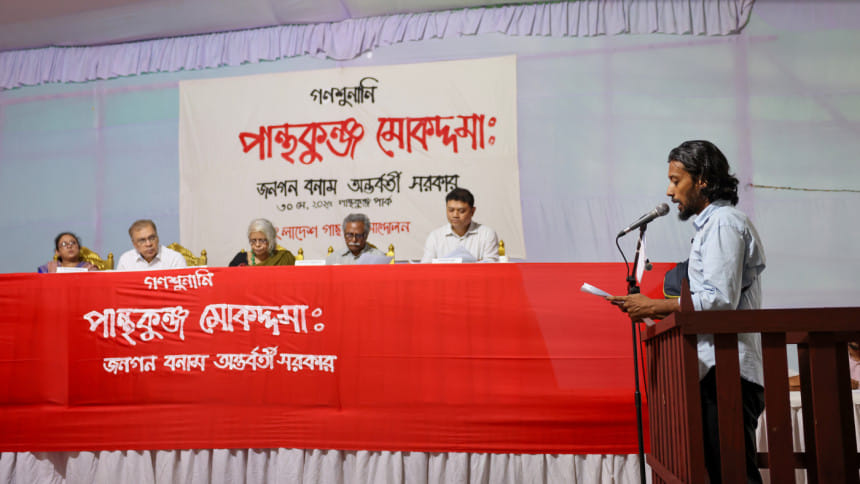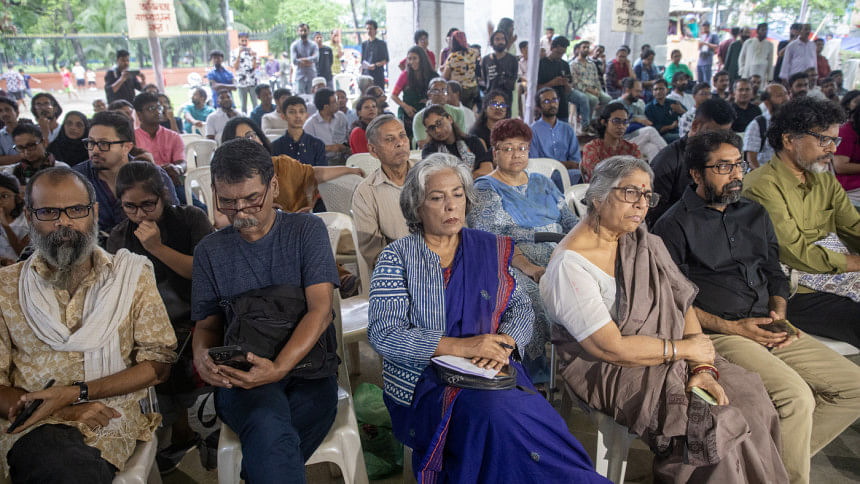Open Panthakunja for all, abandon ramp project

A mock trial yesterday directed the interim government to immediately abandon a ramp of the Dhaka Elevated Expressway, stating it would damage Hatirjheel and Panthakunja.
Considering the overall situation, the public court declared Panthakunja Park open for public use.
The home adviser and relevant authorities were ordered to ensure unrestricted public access to Panthakunja and maintain law and order during the trial, which was held near the SAARC Foara intersection in the capital.
The court directed to suspend all activities related to the connector road until the verdict is implemented, as well as reconsider the contract with the foreign company.
Judges of the court were -- Prof Gitiara Nasreen, member of Media Reform Commission; Shamsi Ara Zaman, general secretary of July Martyrs Memorial Foundation; Prof Anu Muhammad, editor of Sarbojonkotha; Dr Iftekharuzzaman, head of ACC Reform Commission; and Jyotirmoy Barua, convener of Nature and Life Protection Platform.

In the Panthakunja case, the court asserted that the right to file a case in the environmental court must be made accessible to all.
The court also considered the recommendations of the Constitutional Reform Commission highly significant.
According to the commission's proposal: "The commission recommends that any agreement made with (a) a foreign state, (b) an international organisation, (c) a foreign government, (d) a foreign company, or (e) a majority foreign-owned company registered in Bangladesh must be presented in the lower house. Any international agreement that affects national interest or state security must receive prior approval by majority vote in both houses of the legislature. International agreements related to state security will be discussed in the legislature while maintaining necessary confidentiality."
The public court believes that any agreement with the potential to cause environmental harm must be disclosed to the public.
Since environmental damage may become permanent, the court instructed the interim government to enact necessary legislation to bypass delays associated with the Right to Information Act and ensure timely access to information.
If any prior court verdict related to environmental protection is violated, the responsible ministry, department, or agency, including decision-makers, will be held automatically accountable under contempt of court, it said.
The court recalled its earlier ruling recognising rivers as legal entities with rights. In this public hearing, it affirmed that parks, wetlands, and other unique natural open spaces must also be acknowledged as legal persons with rights and given proper protection.
It further stated that the survival and reproductive rights of animals, birds, and insects must be recognised as a state responsibility.
From an urban planning perspective, the court said the acceptability of this project must be reconsidered. Witnesses testified that the proposed ramp would worsen traffic congestion in Hatirpool, Kathalbagan, and Katabon areas, disrupting daily life.
The court directed that future project decisions must take these impacts into account and should not be based solely on financial expenditure, but rather on public interest and utility.
It noted that local citizens' needs were not considered in this project. Panthakunja is the only open space in the area and must remain open and unaltered for people of all ages -- children, the elderly, and women.
The court emphasised that continuing this project would perpetuate the legacy of former fascist, corrupt, unelected governments that operated without transparency or accountability.
Representing the people as prosecutors, Amirul Rajiv and Naeem Ul Hasan, coordinators of the Bangladesh Tree Protection Movement, presented a charge sheet.
Testimonies were presented before the judges by urban planner Adil Mohammed Khan, nature writer and researcher Pavel Partha, environmental activist Syeda Ratna, Founding General Secretary of Panthakunja Probhaty Sangha Sirajuddin Tuhin, and artist Syed Muhammad Zakir.

 For all latest news, follow The Daily Star's Google News channel.
For all latest news, follow The Daily Star's Google News channel. 



Comments